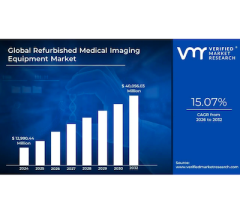
In an era of population health consciousness and uncertainty regarding regulations, healthcare facilities need to be able to rely on technology as a constant in a sea of change. As healthcare facilities move to value-based care, they need to be able to rely on their healthcare technology partner. This extends beyond the initial equipment investment to continued service and support. The service and support a partner provides after the sale can be more important than the sale itself.
The service and support component is important to supporting a healthcare facility’s transition to value-based care. Healthcare facilities need to ask the right questions during the imaging equipment sales process, to help ensure that they secure the right service and customer support from their healthcare technology partner to help minimize disruptions in their ability to provide care. Following are some key questions to ask:
• What are the hours of the customer service team? After-hours coverage is important — hospitals are not typical 9 a.m. to 5 p.m. businesses, they operate 24/7. There is no time to waste when a patient has an emergency or needs medical attention. Approximately 10 percent of the customer service calls received are considered “after hours” calls, that is calls received between 5 p.m. to 8 a.m. weekdays and all day on Saturdays, Sundays and on observed holidays. Due to the importance of after-hours support, it is critical for a healthcare technology partner to have staff available to receive customer calls, including having staff available on holidays. There is no such thing as downtime in healthcare — patient care should be a healthcare facility’s top priority.
• What is the response time of the team? In addition to having 24/7 accessibility to service and support, it is crucial that technology support teams are responsive and effective. To accelerate the response time, premium partners can escalate issues and send a team of engineers on-site at the healthcare facility, which can expedite the service process and allow the healthcare facility to focus on providing patient care.
• Is the service contract structured in a way that focuses on adding value to the healthcare facility? Healthcare facilities’ needs vary, and, therefore, service agreements should not be all or nothing contracts and should take into account the individual needs of the customer. This could include, for example, tailoring the extended warranty and preventive maintenance cycle to the customer’s specific equipment needs. Typically there is very little service needed in the first year after the purchase of any imaging system, however needs evolve over time and depending in large measure on the specific equipment, preventive maintenance is critical for maximum system uptime. A successful healthcare technology partner should strive to provide its customers with equipment uptime of 98 percent.
There are times when a healthcare facility needs to really dig in and ask some questions, such as the following:
• Does the healthcare technology partner invest in the relationship with the healthcare facility by way of offering an additional warranty?
• How often will the partner visit the healthcare facility’s site to service the equipment?
• What type of programs does the healthcare technology partner offer to maintain the equipment after expiration of the initial warranty?
• What is the estimated cost to have the equipment up and running for five years?
• How are software upgrades and updates handled? What is the cost to the customer?
• What training is provided for customers? Healthcare professionals need to be set up for success. This involves providing applications training to the healthcare facilities to teach the healthcare professionals how to use the equipment. In addition, facilities with biomed staff will need to determine if training tailored for that group is available, as biomed teams are usually the first-call support line for a facility. It is a good idea to ask how and where biomed training is offered. Ideally, it will be offered in close proximity to the healthcare facility and be easily accessible (including training options on-site at the customer’s location). Training webinars offer a convenient and cost-effective option to help trained engineers and biomed staff stay up-to-date with technology advancements.
As healthcare professionals evaluate technology options, they are taking one of the first steps toward caring for their patients. A premium partner should understand the need for flexibility and accessibility of support and maintenance. Service and support of imaging equipment plays a role in a healthcare facility’s ability to offer a continuum of care. It’s up to both the healthcare facility and its technology partner to work together to help ensure that healthcare technology supports — not disrupts — the healthcare facility’s ability to provide value-based care.
Jose Conceicao, Sr., is director, national service, customer/technical support and applications, for Virtual Imaging Inc., a Canon company.


 February 04, 2026
February 04, 2026 









